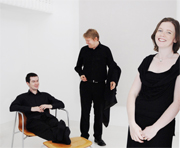
Fidelio Trio: Ricordi – Beyond 200

Salvatore Sciarrino – Piano Trio no.1
Dai Fujikura – moromoro
Peter Eötvös – Two Poems to Polly
Rolf Hind – the thing is
Olivier Messiaen – Fantaisie
Pascal Dusapin – Trio Rombach
King’s Place, Londn, 24 February 2009
On previous occasions, I’ve been a little disturbed by the Fidelio Trio’s programming judgment. They’re fine, ambitious players who I hope to hear for many years, but I’m not sure they always choose the best pieces for themselves. Tonight, however, there was only one real dud: the piano, electronics and video components of Fujikura’s moromoro were poorly characterised in isolation and dreary as a whole.
Sciarrino’s Trio got things off to a much more sparkling start as its opening flood of notes rushed us into a skittering, unstable terrain littered with ball bearings and tripwires – an exciting place to run around in, but very hard to keep one’s footing. With so much of the momentum dependent on the chase of complex timbres and figurations from one instrument to the next it was a shame that balance problems obscured the cello.
Robin Michael came to the fore in Eötvös’s solo for speaking cellist. Eötvös isn’t the world’s most sophisticated composer, but among the inhabitants of the approachable, ‘mainstream’ end of the modernist spectrum he does possess one of the more distinctive voices. This setting of two ancient Japanese poems threatened banality, but something about the melodic shapes, the emotional pacing or the structural clarity retained a trace of the composer’s voice that I found rather touching.
Hind, like many British composers of his generation, seeks something cooler and more empirical. The sound of the trio in the thing is is altered with cello scordatura and some piano preparations, but Hind isn’t interested in deconstructing the instruments’ sonic history or experimenting with the unknown. Rather, the piano notes deadened with strips of rubber are objectively presented sonic objects, signifying nothing but that purposeful decisions on issues of timbre have been taken. The fact that the music itself is broadly diatonic and metrical further prevents our estrangement; but at its heart is a delicate tension between the apparently familiar and the very first glimmer of the strange just on the horizon.
After a commendably unsentimental performance of Messiaen’s Fantaisie for violin and piano, the three players returned for Dusapin’s trio. Dusapin is highly regarded in some quarters, but I’ve yet to hear quite why. Heading the generation of composers following Grisey and Murail, and a branch or two newer than Boulez and Messiaen, I often find plenty of polish and energy in his music, but none of the imagination or bravery of these predecessors. Perhaps it isn’t a fair comparison, but for me the Trio Rombach was well-made and very nice, but to what end?
Tim Rutherford-Johnson
See also: Fidelio Trio at Wilton's